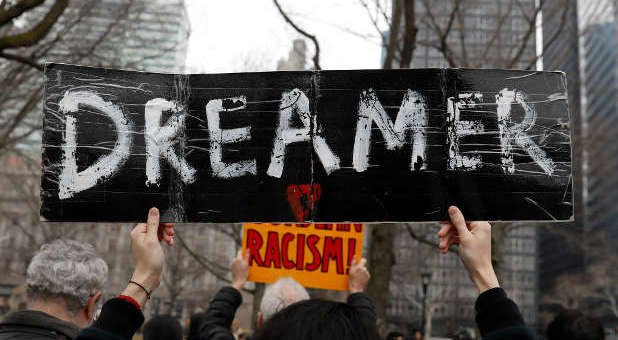Supreme Court Rejects Trump Policy, Refuses to Hear DACA Case
The U.S. Supreme Court on Monday dealt a setback to President Donald Trump, requiring his administration to maintain protections he has sought to end for hundreds of thousands of immigrants brought illegally into the United States as children.
The justices refused to hear the administration’s appeal of a federal judge’s Jan. 9 injunction that halted Trump’s move to rescind a program that benefits immigrants known as “Dreamers” implemented in 2012 by his Democratic predecessor, Barack Obama. Under the Republican president’s action, the protections were due to start phasing out beginning in March.
In a brief order, the justices did not explain their reasoning, but said the appeal was “denied without prejudice,” indicating they will maintain an open mind on the underlying legal issue still being considered by a lower court, the San Francisco-based 9th U.S. Circuit Court of Appeals. The high court also said it expects the lower court to “proceed expeditiously to decide this case.”
Under the Deferred Action for Childhood Arrivals (DACA) program, roughly 700,000 young adult, mostly Hispanics, are protected from deportation and given work permits for two-year periods, after which they must re-apply.
The Trump administration had challenged a nationwide injunction by San Francisco-based U.S. District Judge William Alsup, who ruled last month that DACA must remain in place while the litigation is resolved.
In an unusual move, the administration appealed directly to the Supreme Court instead of going first to a federal appeals court.
Alsup ruled that the challengers, including the states of California, Maine, Maryland and Minnesota and Obama’s former homeland security secretary Janet Napolitano, were likely to succeed in arguing that the administration’s decision to end DACA was arbitrary.
Justice Department spokesman Devin O’Malley said in a statement that the administration will continue to defend the Department of Homeland Security’s “lawful authority to wind down DACA in an orderly manner.”
O’Malley said that “while we were hopeful for a different outcome,” the high court rarely agrees to take up cases before a lower court has ruled, “though in our view it was warranted for the extraordinary injunction requiring the Department of Homeland Security to maintain DACA.”
‘Fully Legal’
California Attorney General Xavier Becerra, a Democrat, called the administration’s bid to bypass the 9th Circuit, which has ruled again Trump on other matters, “unusual and unnecessary.”
“We look forward to explaining to the Ninth Circuit Court that DACA is fully legal. For the sake of the Dreamers who help make our economy and our state strong, the rescission of DACA should not be allowed to stand,” Becerra said in a statement.
The DACA dispute is the latest major case brought to the Supreme Court for its consideration arising from Trump’s immigration policies. The justices are due to hear arguments in April on the legality of his latest travel ban order barring entry to people from several Muslim-majority nations.
Congress so far has failed to pass legislation to address the fate of the “Dreamers,” including a potential path to citizenship.
Trump’s move to rescind DACA prompted legal challenges by Democratic state attorneys general and various organizations and individuals in multiple federal courts. His administration argued that Obama exceeded his powers under the Constitution when he bypassed Congress and created DACA.
On Feb. 13, a second U.S. judge issued a similar injunction ordering the Trump administration to keep DACA in place. U.S. District Judge Nicholas Garaufis in Brooklyn acted in a lawsuit brought by plaintiffs including a group of states led by New York.
Judges Alsup and Garaufis did not say that the administration could not at some point end the program, only that there was evidence it did not follow the correct procedures in doing so.
The rulings allow those who had previously applied for protections and whose two-year status was soon to expire to apply beyond the deadline set by the administration in September.
The original plan put on hold by the court rulings said that only those who re-applied by October and whose status was due to expire by March 5 could re-apply.
The administration is not processing new applications.
Reporting by Lawrence Hurley; Additional reporting by Mica Rosenberg and Andrew Chung; Editing by Will Dunham
© 2018 Thomson Reuters. All rights reserved. {eoa}
















































